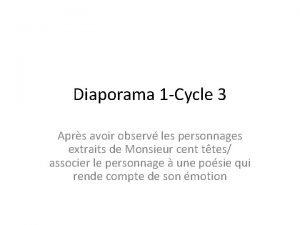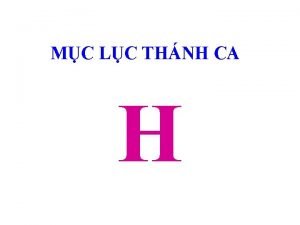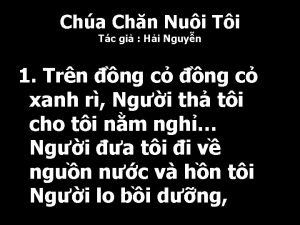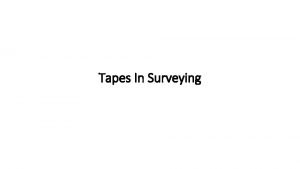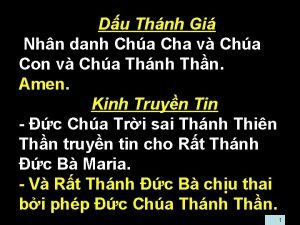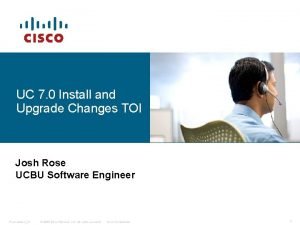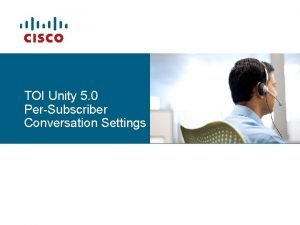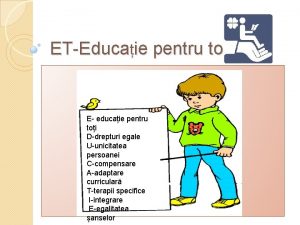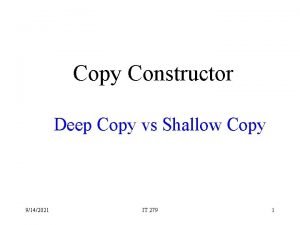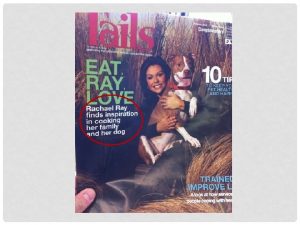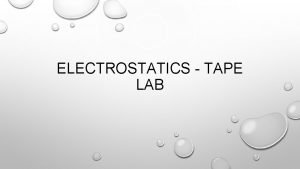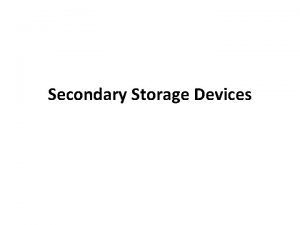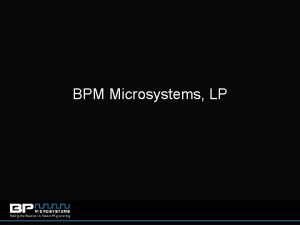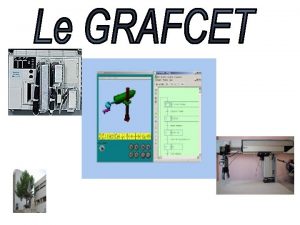Copy to Tape TOI Copy to Tape TOI





















- Slides: 21

Copy to Tape TOI

Copy to Tape TOI Agenda 1 Overview 2 Technical Feature Implementation 3 Q&A 2

General Overview 3

General Overview • Open. Storage copy to tape lets you copy Net. Backup backup images directly from Open. Storage devices to the tape drives that are directly attached to the storage server or attached to an NDMP host. • This feature allows for the customer to perform direct Copy to Tape operations via SLP (storage lifecycle policies). The Media Server is not a data mover for this type of operation and that results in network bandwidth savings – as the data movement only has to make one hop. • This is a new feature to Net. Backup. 4

Technical Feature Implementation 5

Technical Feature Implementation • Process/data flow – Data flows from the Open. Storage Device, through the NDMP Server to the Tape Robot 7

Requirements The following are the requirements to use Open. Storage copy to tape: The Open. Storage disk appliance must support the Open. Storage copy to tape specification published by the Symantec Open. Storage Partner Program. The copy to tape capability uses a subset of the NDMP File Service Extension (FSE)commands. 8

Requirements In this document, disk appliance NDMP host refers to the host that provides the Open. Storage copy to tape support. The host may be the disk appliance storage server, an alternative name (that is, interface) for the storage server, or a separate host that interacts with the disk appliance. Regardless, the host must support the Open. Storage copy to tape specification. The host to which the destination tape drives are attached must be an NDMP tape server that Net. Backup supports. For supported systems, see the Net. Backup for NDMP Administrator’s Guide. Ideally, all of these functions reside on a single host. 9

Requirements The read side media server must run Net. Backup 6. 5. 4 or later. Net. Backup selects the read side media server from the Net. Backup media servers that have credentials for the disk appliance NDMP host. To allow all of the Open. Storage data movers (that is, Net. Backup media servers) to function as read side servers, upgrade all of them to Net. Backup 6. 5. 4. 10

Requirements One of the read side media server’s tasks is to ensure that the disk appliance NDMP host supports the Open. Storage copy to tape specification. The write side media server can run Net. Backup 6. 5 or later. The destination storage unit specifies the write side media server. The write side media server requests resources from the NDMP tape server and initiates and monitors the copy operation. 11

Installation 1. Install the Net. Backup for NDMP software on the Net. Backup media servers that connect to the NDMP tape server. 2. In Net. Backup, configure the NDMP tape server as an NDMP host. 3. In Net. Backup, configure NDMP host credentials for the NDMP tape server. 12

Use 1. In Net. Backup, configure the NDMP tape server storage devices. 2. In Net. Backup, configure the storage units that use the NDMP tape server storage. The storage units must be configured as NDMP storage units. 3. Create the storage server on each media server you wish to use for either backups or duplications. 13

Use (continued) Use the command: /usr/openv/netbackup/bin/admincmd/nbdevquery liststs –U This will obtain the name of the disk appliance NDMP host. If the name of the disk appliance NDMP host is different than the disk appliance storage server name, add the credentials for that NDMP host to Net. Backup. Please note that you will need to add credentials for the storage server to Net. Backup if the name of the disk appliance NDMP host and the disk appliance are the same (single host). Use the tpconfig command for this step. 14

Resources Documentation is available in the standard Net. Backup documentation (Admin Guide). Note- The output of the “nbdevquery –U” command has been changed to display the direct Copy to Tape capability and the corresponding NDMP hostname. 15

Limitations The following limitations exist: ■ The destination storage unit must be NDMP and not a Storage Unit Group. ■ You cannot make multiple copies with one copy operation. ■ Backup images are not multiplexed when written to tape. ■ If the disk appliance NDMP host does not support NDMP FSE, copy operations travel through Net. Backup media servers. 16

Troubleshooting methods are similar to standard NDMP Tape Server and BPDuplicate troubleshooting methods. 17

Logs and Messages • Key Log Messages: Log: /usr/openv/netbackup/logs/admin “NDMP Direct Copy will be attempted” -> good “NDMP Direct Copy will not be used” -> bad “DUPREADLINE: READ: NDMP_DC_ENABLED=1” -> good User initiated duplications: In the “Results” tab of the Catalog GUI: “Initiating Open. Storage Direct to Tape” -> good 18

Logs and Messages (continued) In the event of a failure, support will need to see the following: – bptm logs for read and write media servers – admin logs for duplication server (typically this is the Master server) – Vx. VL logs for mds (event id 143) and NDMP (event ids 151 and 134) 19

Q&A 20

Links and Resources NDMP org is the definitive source for NDMP specifications. Here is the NDMP org website faq: http: //www. ndmp. org/info/faq. shtml Here is a good overview doc on NDMP: http: //www. ndmp. org/download/sdk_v 4/ndmp-overviewr 2. ppt#279, 29, Slide 29 Search sourceforge. net for NDMP FSE. Here is the download link for NDMP FSE: http: //downloads. sourceforge. net/project/ndmfs/0. 8/ndmfs_0. 8. t ar. gz? use_mirror=cdnetworks-us-1 21

Thank You! Copyright © 2008 Symantec Corporation. All rights reserved. Symantec and the Symantec Logo are trademarks or registered trademarks of Symantec Corporation or its affiliates in the U. S. and other countries. Other names may be trademarks of their respective owners. This document is provided for informational purposes only and is not intended as advertising. All warranties relating to the information in this document, either express or implied, are disclaimed to the maximum extent allowed by law. The information in this document is subject to change without notice. © 2008 Symantec Corporation. All rights reserved. 22
 Quan hệ tương đương toán rời rạc
Quan hệ tương đương toán rời rạc Bà tôi ngồi cạnh tôi chải đầu
Bà tôi ngồi cạnh tôi chải đầu Toi qui plies, toi qui pleures
Toi qui plies, toi qui pleures Toi qui aimes la vie
Toi qui aimes la vie Toi le pauvre toi mon frère
Toi le pauvre toi mon frère Nào cùng nhau ta lớn tiếng hát vui mừng
Nào cùng nhau ta lớn tiếng hát vui mừng Chúa chăn nuôi tôi tôi chẳng thiếu thốn chi
Chúa chăn nuôi tôi tôi chẳng thiếu thốn chi Metallic tape in surveying
Metallic tape in surveying Kinh bởi trời
Kinh bởi trời De toi
De toi Parole psaume de la création
Parole psaume de la création Giêsu chúng con tới đây sấp mình
Giêsu chúng con tới đây sấp mình Vua nào thần tốc quân hành mùa xuân
Vua nào thần tốc quân hành mùa xuân Mot de bienvenue au culte d'adoration
Mot de bienvenue au culte d'adoration Prend cette rose aimable comme toi
Prend cette rose aimable comme toi Tout petit devant toi
Tout petit devant toi Anh cút ra khỏi nhà tôi ngay nói giảm nói tránh
Anh cút ra khỏi nhà tôi ngay nói giảm nói tránh écoute écoute surtout ne fais pas de bruit paroles
écoute écoute surtout ne fais pas de bruit paroles Sự ngang ngược và tội ác của giặc
Sự ngang ngược và tội ác của giặc Triomphons chantons d'allegresse
Triomphons chantons d'allegresse Install toi
Install toi Toi mon amie la rose
Toi mon amie la rose


